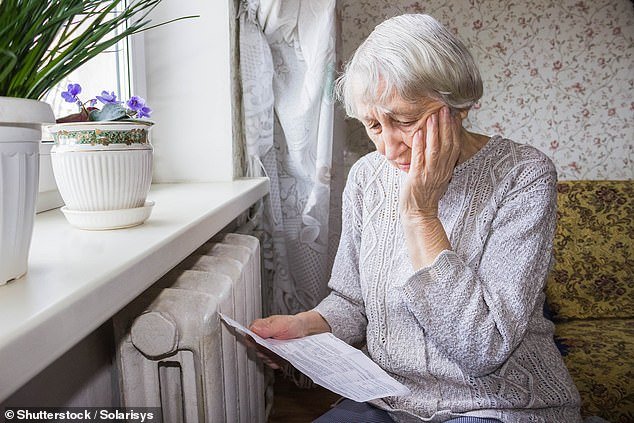The Daily Observer London Desk: Reporter- Victoria Smith
Three in five over 60s with a household income of £20,000 or less have cut back on heating or powering their homes in order to make ends meet, research claims.
As the cold weather kicks in, 8.9million, or 54 per cent, of over 60s are worried about being able to pay their energy bills this winter, Age UK said.
Not all government financial assistance is open to every pensioner, and eligibility criteria often apply, notably for pension credit.
One unnamed 72-year-old man, ineligible for pension credit, told Age UK: ‘I don’t know how I am going to manage.
Hard times: Millions of over 60s are worried about being able to pay their energy bills this winter, Age UK said
‘I’ve applied for pension credit, but got turned down and because of this I’m not eligible for the cost of living payouts this year.
‘The only extra money I received is a £200 discretionary payment from the council. I do get housing benefit, but it still leaves me £200 short because my rent has increased.’
Meanwhile, a 67-year-old woman told Age UK: ‘I am constantly economising.
‘I wear extra clothes but do find my hands go tingly as I’m cold. I don’t drive and cannot travel easily due ill health, and now can’t afford taxis to get around or socialise. I try to shop around but cannot keep up with price changes in different shops. Money decisions make everything more stressful.’
A 79-year-old man, said: ‘All of this year’s state pension rise, plus my savings is simply disappearing due to the huge range of price rises and cost of gas and electric, council tax, home insurance and the absolutely disgraceful continuing rise in all foods of every kind.
‘Absolutely everything has increased in price.
‘Millions of pensioners are simply existing or living in fear about the future.’
The average home currently pays energy bills of £1,834 a year, alongside sky-high costs for food, fuel and other essentials.
Age UK said 7.3million people, equating to 44 per cent of over 60s, have already cut back on social and leisure activities amid higher bills for basics like energy and food.
It claimed that 2.6million over 60s have cut back on their telephone, internet and water usage in a bid to keep costs down.
Caroline Abrahams, charity director at Age UK said: ‘There’s rising concern about how some older people will cope when the temperature dips and they need to turn up the heat.
‘Our new statistics reflect what we are also hearing on the Age UK Advice Line: many on low and modest incomes are already fretting over how they’ll keep their heads above water when the winter bills come rolling in.
‘As ever, our biggest worry is that they will be so frightened of being unable to pay that they’ll turn their heating down too low through the colder months, if they run it at all, jeopardising their health.
‘After two tough years of this vicious cost of living crisis some older people say they are unsure how they’ll get through a third, having run down their savings and made all the economies they can.
‘That’s why we are calling on the Chancellor to announce more financial support for those older people who really need it this winter in his Autumn Statement, to give them the confidence and wherewithal to stay warm through the chilly weather.’
She added: ‘Unfortunately, the experts say that energy prices are set to go up in January, dip in April and remain at high levels for the rest of 2024.
‘There is no certainty that bills will become manageable again in the near future and this is bound to have a detrimental effect on older people’s ability to stay warm and well.
‘Given these forecasts, the Government must go further and do more to protect all the older people whose low and modest incomes place them in a precarious position this year and next.’
In October, Age UK said 4.2million, or nearly a third, of older people in the UK had cut back on food and other groceries as stubbornly high costs continue to affect living standards.
What financial help is available?
Pension credit
Pension credit tops up weekly income to a minimum of £201.05 for single people and £306.85 for couple.
Having savings can affect how much people receive in pension credit, but a rainy day fund of up to £10,000 will be disregarded if your income is low and other eligibility criteria is met.
Age UK thinks there are between 400,000 to 500,000 households in the UK eligible for pension credit and receiving housing benefit or a council tax reduction, but not claiming for pension credit.

Bill woes: Soaring energy bills have hit many pensioners hard this year
Of perhaps even greater concern are the people who remain on a low income, but just miss out on meeting the eligibility criteria required for pension credit.
Age UK said: ‘Many will have meagre incomes that taken them just above the level to receive pension credit – perhaps because of a small private pension, or because the full new state pension is set just above the basic pension credit rate.
‘Not only do they miss out on extra weekly income and other discounts associated with claiming pension credit, they will also miss out on the £300 Cost of Living payment this autumn and £299 in spring next year.’
Winter Fuel Payment
The Winter Fuel Payment, is worth from £100 to £300, and are made to those born before 25 September 1957.
How much you get varies depending on factors such as when you were born and which benefits you claim.
The payments are usually made in November or December, with eligible households getting confirmation letters in October or November.
If you think you might be eligible for the Winter Fuel Payment but haven’t received a letter, you can apply by post or telephone.
Cost of Living Payment
The £300 Pensioner Cost of Living Payment will be paid to all households in receipt of Winter Fuel Payments, in the same way as last year.
The Government said this week: ‘Pensioner households will also receive £300 which will be paid as a top up to those eligible for the Winter Fuel Payment in November and December.
‘Combined with the one-off Cost of Living Disability Payment earlier this year, some households will receive £1,350 in total.’
Warm Home Discount
The Warm Home Discount is a £150 payment towards the cost of energy.
It goes out to two groups, namely those who get the guarantee credit element of pension credit and those on certain means-tested benefits.
Households with a standard meter get the £150 as a rebate on their bills, while those with pre-payment meters get a voucher.
The money is not paid to you. It is a one-off discount applied to your electricity bill between early October 2023 and 31 March 2024.
Those who may be eligible will receive a letter by early January 2024.
If you do not get a letter and you think you are eligible for the Warm Home Discount, contact the Warm Home Discount Scheme before 29 February 2024.
Grants from energy firms
Customers struggling with high energy bills can get help from energy firms including grants of up to £1,500, free electrical goods and better insulation.
For example, British Gas has grants of up to £1,500, for both its own customers and those signed up to any other energy firm.
Other energy firms such as Octopus Energy and EDF have their own schemes too.
But, most will require successful claimants to be low incomes or otherwise unable to afford energy bills, and may have other criteria too.
Cash or vouchers from Household Support Fund
Households struggling with the cost of living can apply for cash and vouchers from the Household Support Fund.
That is a pot of Government cash that is handed out by local councils to people in their region.
The scheme was topped up with £842million in April of this year, and will run until April 2024.
The scheme is a postcode lottery, as each council decides how to hand out the money – and to whom.
Some councils will give out vouchers, and others cash, for example.
Local authorities have paid money and vouchers worth up to several hundred pounds per home.
Anyone can apply, but they may need to meet eligibility rules, such as having a low income.



